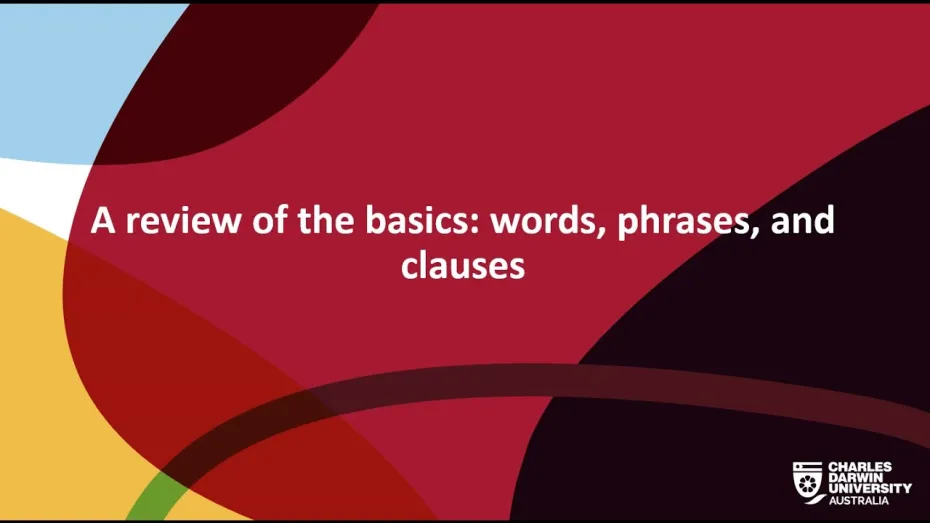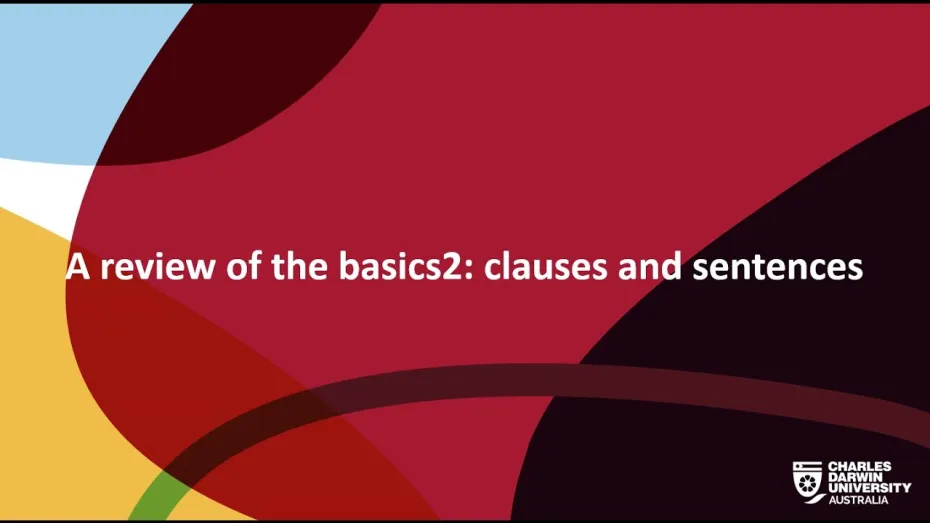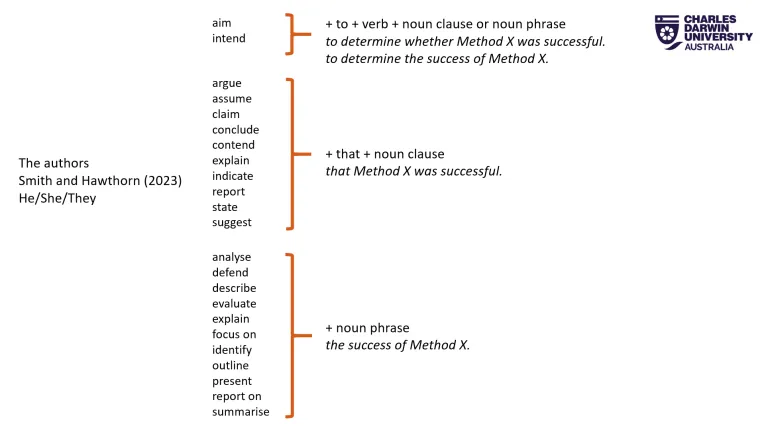When you read the grading rubric of your assignments, you may notice the words grammar and syntax. Grammar can be defined as the system and structure of language. Syntax is one element of grammar. It can be defined as how words, phrases, and clauses are arranged to create sentences. As CDU students, you have access to Grammarly to help you improve the grammar and syntax in your assignments. You may also use other online tools for editing. However, you can use these tools more effectively if you understand the fundamentals of grammar and syntax.
This page aims to help you:
- understand the advice offered by online editing tools
- revise words, phrases and basic sentence structure
- identify different types of sentences
- identify different types of clauses
- avoid common pitfalls.
Download this summary sheet for your own reference.
Effective use of Grammarly
This section will give an overview of how you can use Grammarly to improve the accuracy of your writing.
Introduction
All students at CDU have access to Grammarly. You can find the icon on your student portal and use this to set up your account.
Grammarly can be a very useful tool for improving the accuracy and readability of your writing. However, you must understand what it can and cannot do.
| Can usually do well | Can do in a limited way | Cannot do |
|---|---|---|
|
|
|
Understanding and using Grammarly feedback is an important skill. For now, it is important that you:
be aware of Grammarly's limitations
develop your knowledge of grammar, punctuation and style so you can evaluate Grammarly's suggestions
pay attention to the errors that Grammarly identifies so you can learn from your mistakes
focus on developing your arguments and critical thinking.
Understanding Grammarly functions
- Task: Understanding Grammarly functions. Before you use Grammarly you should be familiar with the settings and functions. Click on the hotspots to learn more.
Using Grammarly thoughtfully
Grammarly is a useful tool, but it is not perfect. You need to use it thoughtfully and purposefully. Don't automatically accept every suggestion it makes.
To make the best use of Grammarly, you need an understanding of grammar, syntax and vocabulary. Read through the rest of this material, so that you can:
- learn grammar terminology
- better understand the suggestions Grammarly makes on your writing
- make more informed decisions about which Grammarly suggestions to accept
- be less dependent on Grammarly overall.
Words, phrases and clauses
This section revises the basics of words, phrases and clauses. These basics can help you tackle more advanced grammar later.
Introduction
This video revises the basics of words, phrases and clauses. It will introduce you to useful terminology that may help you to understand feedback on your writing.
Reflect on what you just learned. Write down three main points that you want to remember.
Words
You don't need an in-depth knowledge of grammar terms to write accurately. However, being familiar with the most common terms may help you understand feedback and the advice you get from online editing tools.
Words can be categorised according to their function. Remember:
| Type | Function | Examples |
|---|---|---|
| Nouns | Name things and concepts. They express who or what. |
|
| Adjectives | Describe nouns. |
|
| Verbs | Express actions and link items. |
|
| Adverbs | Describe verbs and adjectives. They express when, where, how or why. |
|
| Prepositions | Express relationships between things. |
|
| Pronouns | Replace nouns. |
|
| Determiners | Identify what we are referring to. |
|
| Conjunctions | Link things and ideas. |
|
Read this sentence. Can you identify the different word types?
In this study, the authors used a randomised design and patients, after surgery, were randomly allocated stockings that were below-knee or thigh-high.
- Task: Types of words. Now, confirm your thoughts by identifying the different types of words in this task.
Reflect on this task. Do you need to revise any of the word types? Look again at the table above.
Phrases and clauses
Words are combined to build phrases and clauses. Remember:
Phrases are groups of words that work together to express an idea, but don't have a subject and verb. They need the rest of the sentence to make sense. Examples include a bright sunny day, in the library, have been working.
Clauses are groups of words that work together to express an idea, but they do have a subject and a verb. Sometimes, a clause can be a sentence. Examples include the sun shone, after she finished, they have been working. You will learn more about this in the next section.
Applying your learning
Learning is more effective when it is applied to your own work.
Locate a weekly reading for one of your units and examine the first paragraph. Can you identify different types of words and locate the phrases?
When you are studying vocabulary, a useful strategy is to record words in families. When you note new vocabulary from your classes, create a table and record the forms of each word. For example:
| Noun | Verb | Adjective |
|---|---|---|
| abutment | abut | x |
| ellipse | x | elliptical |
Note the prefixes and suffixes while you do this. It will help you to remember.
Clauses and sentences
This section will introduce you to two basic clauses - dependent and independent - and to four types of sentences.
Introduction
This video revises the basics of clauses and sentences. It will introduce you to useful terminology that may help you to understand feedback on your writing.
Reflect on what you just learned. Write down three main points that you want to remember.
Dependent and independent clauses
Think back to the video. Remember that:
- Independent clauses are complete ideas. A simple sentence is an independent clause. One example is: The students worked hard.
- Dependent clauses are incomplete ideas. They cannot stand alone because they need more information to make sense. One example is: because they wanted distinctions.
Remember: a dependent clause must be linked to an independent clause to complete the idea. A dependent clause without an independent clause to help it is called a sentence fragment.
- Task: Identifying the sentence fragments. Read the sentences below. Which ones are independent clauses and which are dependent clauses, or sentence fragments. Click the boxes.
Conjunctions
In the video, you learned about:
- Co-ordinating conjunctions—words such as and and but link two independent clauses.
The student worked hard and she passed her exam.
- Subordinating conjunctions—words such as who, since, and because link dependent clauses to independent clauses.
Because the student worked hard, she passed the exam.
To this, we can add:
- Conjunctive adverbs – words such as however, consequently, and furthermore link two independent clauses with a semi-colon and comma.
The student worked hard; consequently, she passed with flying colours.
Download this PDF which provides a handy list of conjunctions.
Sentence types
In the video, you learned about four types of sentences:
| Simple | A simple sentence contains an independent clause. | The student worked hard. |
|---|---|---|
| Compound | A compound sentence is two independent clauses joined by a co-ordinating conjunction. | The student worked hard and she passed her exam. |
| Complex | A complex sentence contains an independent clause and one or more dependent clauses joined by subordinating conjunctions. | If she hadn’t worked hard, the student would have failed her exam. |
| Compound-complex | A compound-complex sentence contains one or more independent clauses and one or more dependent clauses. | Although the student had faced some challenges, she worked hard and passed her exam, and this made her very happy. |
Applying your learning
Learning is more effective when it is applied to your own work. Analyse a draft of an assignment that you are writing for one of your units.
- Check each of your sentences. Can you identify a subject and a verb in each clause?
- Check again. If a sentence has more than one clause, are they linked with an appropriate conjunction?
- If you find it difficult to do this with your own work, exchange drafts with a peer. It is often easier to spot problems in someone else's work.
Complex sentences and dependent clauses
This section will explore complex sentence structures in more detail. It will review four types of dependent clauses: adverb, adjective, noun and reduced.
Introduction
In the previous sections, you learned that words and phrases can be categorised by their function. This also applies to dependent clauses.
Reflect on what you know about the different word types and their functions.
How could clauses perform these functions?
Consider these dependent clauses.
- How do you think they have been categorised into three groups?
- Can you identify the clause types by their functions?
- Task: Dependent clauses. Drag the labels to the correct place on the table. Then click through to the next screen to learn more.
If you need more information, the clauses are explained further in the following sections.
Adjectival (relative) clauses
Adjectival clauses are sometimes called relative clauses. Like adjectives, they describe nouns. Compare these examples:
- Kim got excellent grades.
- Kim got grades that are excellent.
In sentence 1, the writer chose to use an adjective. In sentence 2, they chose to use a clause. Both choices describe the noun grades.
Adverbial clauses
Like adverbs, these clauses give more information about an action. They may express when, where, how or why. They may also express cause, effect, comparison, condition and concession.
Compare these examples:
- They meet their friend after class.
- They meet their friend after they finish class.
In sentence 1, the writer chose to use an adverbial phrase. In sentence 2, they chose to use a clause. Both choices give more information about the verb meet.
Consider these examples. Can you identify:
- the adverbial clauses
- the action (or verb) that the adverbial clauses give information about.
| They met their friend after they finished their assignment. |
| Because the assignment was challenging, the students worked together in the library. |
| If they work hard, they can pass the unit. |
Noun clauses
Like nouns, noun clauses identify things or concepts. They can also act as the subject or an object of a sentence.
Compare these examples:
- They remember what the lecturer advised them.
- They remember the lecturer’s advice.
In sentence 1, the writer chose to use a noun clause. In sentence 2, they chose to use a noun phrase. Both choices act as the object of the verb remember.
You may use noun clauses regularly when you are referring to sources in your assignments.
- Fong (2023) explored whether tutoring would improve grades.
- In a recent study, Smith (2022) stated that student self-efficacy affects performance.
Some reporting verbs are usually followed by noun clause and some by a noun phrase. These include:
Reduced clauses - participle phrases
You may sometimes see clauses that don’t seem to have subjects or verbs. These may be reduced clauses, which are sometimes called participle phrases.
A participle is a verb in its –ing or –ed form. We frequently use these as adjectives. For example:
| The unit interests me. | The interesting unit is offered in first semester. I remained interested throughout the semester. |
Reduced adjective and adverbial clauses were briefly introduced above. This section offers more information.
1. Reduced adjective clauses
When the adjective clause has a relative pronoun as the subject, you can do one of the following.
- Active voice: drop the relative pronoun and change the verb to its –ing form.
- Passive voice: drop the relative pronoun and the verb to be.
| Active voice | Everyday, I see students | who study in the library studying in the library. |
|---|---|---|
| Passive voice | The senate approved the change | which was opposed by students opposed by students. |
2. Reduced adverbial clauses
When the subject of the independent and the adverbial clause are the same, you can choose to:
- drop the subject of the adverbial clause and use the –ing form of the verb
- drop the subordinating conjunction and the subject and use the verb having.
| -ing form | When I visit the library, When visiting the library, | I often book a study room. |
|---|---|---|
| Add having | Because I booked a room, Having booked a room, | I could study in peace. |
Refer to this table to help you decide whether to use or drop the conjunction.
| Use the conjunction | Drop the conjunction | Either use or drop |
|---|---|---|
before since (time) | because since (reason) as | after while when |
Infinitive phrases and clauses
You may sometimes see clauses that don't seem to have both a subject and a verb. Some of these may be infinitive clauses.
You know that verbs change form (inflect) according to the person and to time. Infinitive verbs don't inflect.
| Regular verbs: with inflection | Person |
|
| Tense/Time |
| |
| Infinitive verbs: without inflection | Infinitive with to |
|
| Bare infinitive |
|
We can use infinitives in these ways:
1. Full infinitive
| As a phrase | To pass the unit, the students spent hours in the library. |
|---|---|
| As a subject | To drop a core unit seems foolish. |
| As an object | Students should try to submit all assignments. |
| Attached to another clause | We came to the library to complete the work. |
2. Bare infinitive
| After rather than | He would walk all night rather than miss a deadline. |
|---|---|
| After sense verbs (e.g.: see, hear, smell) | I didn't hear the lecturer give that advice. |
Common problems
The sections reviews common problem areas for students.
Sentence fragments
Sentence fragments were introduced above. This section explains three problems and how to fix them.
Run-on sentences and comma splices
A run-on sentence occurs when two independent clauses follow each other without an appropriate linking word or punctuation.
- I enjoy exercise I would run every day if I could.
A comma splice occurs when two independent clauses are separated by a comma.
- I enjoy exercise, I would run every day if I could.
To correct these problems, you should separate two independent clauses with a full-stop or join them with a conjunction.
- I enjoy exercise. I would run every day if I could.
- I enjoy exercise and I would run every day if I could.
Misplaced and dangling modifiers
A modifier is something that modifies - or gives more information about - something. Simple modifiers are adjectives and adverbs. Phrases and clauses can also be modifiers.
- Task: Problem 1: Misplaced modifiers
- Task: Problem 2: Dangling modifiers
- Task: Dangling and misplaced modifiers. Consider what you have learned about this problem. Try to spot the issues in the following sentences.
Over to you:
- Reread a draft you are working on.
- Look for words. phrases and clauses that are modifying, or describing, something.
- Ensure that they are placed as close as possible to the item they are modifying.
Parallel structure
When we list a number of components in a sentence, we must keep the same grammatical structure.
Example 1:
The main student attributes include an ability to communicate well, think critically, and problem solving.
This is not a parallel structure because it uses a noun phrase, verb/noun and noun. The following sentence is correct as all nouns are used.
The main student attributes include effective communication, critical thinking, and problem solving.
Example 2:
Because of northerly winds blowing, out of control bush growth and the lack of rainfall, the fire quickly spread.
This is not a parallel structure because it uses a noun/verb phrase, noun phrase, and noun phrase. The following sentence is correct as all noun phrases are used.
Because of the northerly winds, the uncontrolled growth of the bush and the lack of rainfall, the fire quickly spread.
Determiners: articles
Articles are a type of determiner. English has two types of articles: definite (the) and indefinite (a, an.) When we decide whether to use an article and what type, we must consider the following questions:
| Is it general or specific? | Coffee is a popular drink. The most popular drink in Australia is coffee. |
|---|---|
| Is it countable or uncountable? | I drank a cup of tea. We drank tea. |
| Is it mentioned for the first time? | A cyclist crossed Trower Road on a red light and was lucky not to be hit by a car. However, the police noticed and stopped the cyclist further up the road. |
| Is it unique or shared knowledge? | New currency will be issued with images of the king. |
| Is it a proper noun? | The Doppler Effect. Einstein's theory of relativity. |
Subject verb agreement
Many students are familiar with the basic rules of subject verb agreement.
Example:
- He is standing for election.
- They are voting.
It becomes more complicated with the following sentence constructions:
| Using a noun phrase |
|
|---|---|
| Indefinite pronoun (such as someone, anyone) |
|
| A phrase starting with a quantifier (such as some, any) |
|
| Sentences that begin with verbs ending in 'ing' |
|
Using conjunctions such as:
|
|
Did you know CDU Language and Learning Advisors offer a range of study support options?
https://www.cdu.edu.au/library/language-and-learning-support




